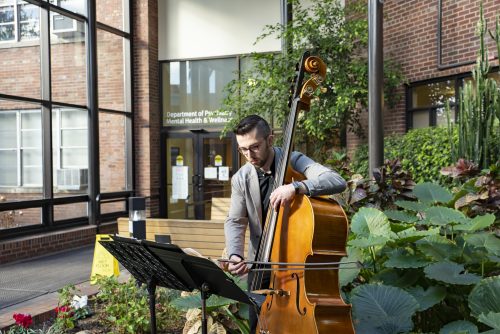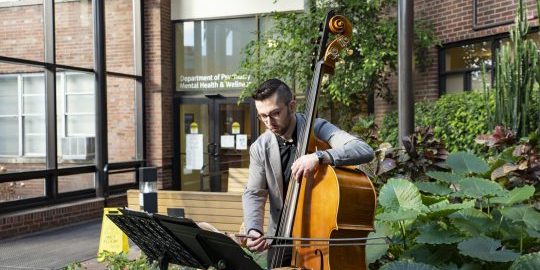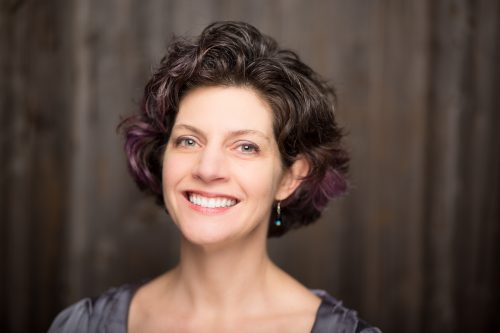
Eastman student Andrew O’Connor during an EPAM performance at URMC, December 2019. Photograph by Michelle Martorell.
by Raffi Wright
In preparation for Summer at Eastman 2022, we have been interviewing some of our course instructors. For this edition, I sat down with Gaelen McCormick to discuss one of the two courses she is teaching this summer: “Music in Medicine – ONLINE.” In this six-week online workshop, students will explore the connection between music and medicine while also learning about Eastman Performing Arts Medicine (EPAM), a joint venture between Eastman and URMC; Gaelen is EPAM’s inaugural Program Manager. The course is an invitation to reach one’s full potential to become a healthy musician.
Here are some highlights of our time talking together:
RW: How did you become interested in learning about music’s role in healthcare and medicine?
GM: When I started to volunteer to play my double bass in the Wilmot Cancer Center lobby, I was very interested to see the response of patients, staff, and family members. It was so clear that music was more than entertainment in this scenario. Sometimes folks fell asleep right next to me, and sometimes they purposefully pulled up a chair to read right near where I was playing. Something sympathetic was happening.
I had also joined the music cognition symposia series at Eastman, which is a regular meeting of researchers in the space of music and medicine. I was inspired to see what music could do for someone with Parkinson’s disease, for example, offering a steady beat that allows the legs to return to a more normal cadence. Reading Oliver Sacks’ book Musicophilia really opened my mind to how deeply interconnected music is within our brain and our bodies. I highly recommend this book as it is a series of patient vignettes all related to music or arts-related illnesses and interventions–very story-driven.
RW: Tell us about your work with Eastman Performing Arts Medicine (EPAM): what projects are currently underway, and what are you hoping to develop?
GM: Eastman Performing Arts Medicine has been bringing live music to the hospital for almost three years now. The pandemic forced us to find a new way to reach patients and staff. Through technology like zoom and the entertainment service on the hospital TV system, we have continued to find ways to bring relaxation and distraction to patients. For instance, twice a week we will have a musician playing from their home or from a quiet space at the Eastman School, and a nurse will bring an iPad to a patient who has elected to receive this visit. The patient will be able to see and hear the musician, ask them questions, and even make requests such as do you know this particular composer? We have had some very funny requests! One person asked for Queen, Bohemian Rhapsody (our pianist was able to do this!) and another person asked for the music of Kiss (we were not able to fulfill that request…).
Eastman Performing Arts Medicine is also exploring the research behind what is happening in the mind and in the body when music is being used in connection with other healing therapies. For instance, we are studying the effect of music therapy on breast cancer patients receiving radiation therapy period to see if the music therapy will allow them to have less anxiety, which can in turn expedite their treatment, thereby shortening the total treatment time.
This program is very broad and robust! Another way Eastman Performing Arts Medicine is involved in our community is discovering how we can serve performing artists in their Wellness needs. We host a monthly series of speakers who talk about topics ranging from hearing health to physical health to mental health. Any musician with an injury which is impeding their ability to perform is able to call our hotline and be connected to one of our specialists who will see them within 48 hours. This is quite unusual and an excellent service for musicians anywhere in the US.
RW: What can musicians learn from working in medicine-related settings? What can medical professionals learn from musicians and music therapists?
GM: When musicians work in health care settings, one thing they learn is to tap into what music truly means to them and means to their listener. We move away from the outward focus that we have as performers (meaning: I play, you clap; no dialogue, no interaction). This is quite the opposite of that! In the health care setting we are focused on sharing the experience and supporting the listener. My mentor says something which is my mantra in this situation, “they are not here for you. You are here for them.” Musicians learn to modify their tempo and their dynamics in this situation. They learn to read the room, and to put themselves in service to what is happening around them. It is both humbling and intensely gratifying for both the performer and the listener when this interaction level is achieved.
What health care professionals gain from this interaction with musicians is another tool in their toolkit, or another support for themselves and for their patients. I often hear from doctors and nurses that they try to schedule their charting time (writing patient notes) when the music therapist is visiting a patient so that they can also enjoy the music and the interaction which is happening. There is an increased focus on using nonpharmacological (meaning “not meds”) interventions for pain, and music therapy has all kinds of ways to handle distraction diversion and also behavioral adaptations for dealing with pain.
RW: What are you most excited for about this course?
GM: This arts and health course is a chance for many of my colleagues to meet our artists (who will attend); it gives them the opportunity to understand how musicians are excited to participate in this field. I am also looking forward to sharing the wisdom of the healthcare professionals who will be part of our course. One of my favorite things that happens during the musician training on the Eastman campus, which I hope will happen this summer, is the dialogue that occurs between musicians and health care providers: wonderful new ideas about how music might be a part of the environment or the healing process.
RW: What do you hope participants gain from this experience?
GM: Participants in this course will gain a fuller understanding of the many ways the arts are used in healthcare spaces. Musicians in particular will learn ways they could approach their own health care facilities to begin a conversation about offering these gifts to their community. Most importantly, participants will understand how to think about the music they bring into these environments.
RW: Is there anything else you would like to share either about yourself or this course?
GM: There is no prior healthcare experience required to succeed in this course. While many participants often come to this type of course having played in a nursing home or for relatives while they were ill or recovering from a surgery, we will cover all types of situations to help the participants think about what would be appreciated and supportive in different health care environments.
***
Music in Medicine – ONLINE runs from June 27-August 5; weekly synchronous classes will be scheduled by the group before Summer Session begins. Visit the course web page for details and registration information.

